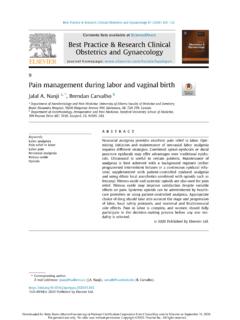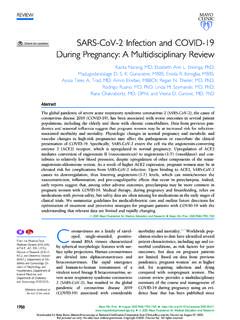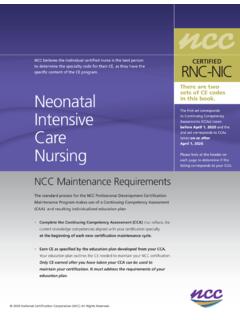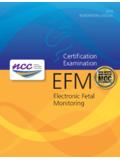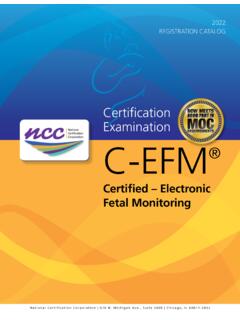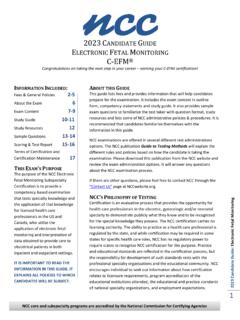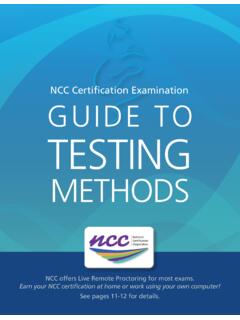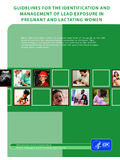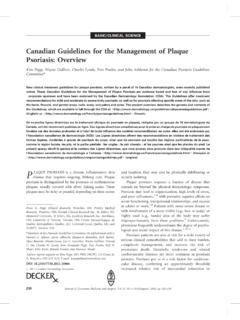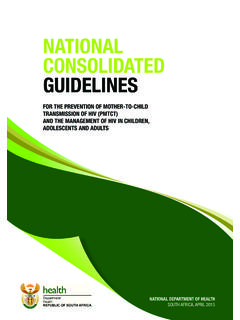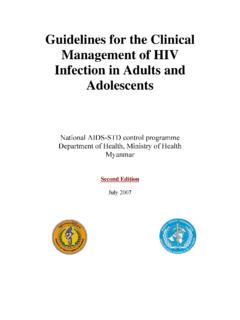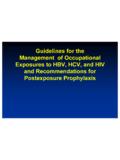Transcription of Psychiatric Emergencies in Pregnant Women
1 Psychiatric Emergencies inPregnant WomenMichael P. Wilson,MD, PhDa,b,*, Kimberly Nordstrom,MD, JDa,c,Asim A. Shah,MDd,e, Gary M. Vilke,MDa,bINTRODUCTIONM ental health-related visits to emergency departments (EDs) are common. From1992 to 2001, approximately 53 million ED visits in the United States involved a behav-ioral health 2011, approximately of visits involved a dischargediagnosis of mental disorder, although is unknown how many of these visits solelyinvolved Pregnant there are increasing numbers of visits to EDs in the United States, clinicalresearch in the field of emergency medicine remains gap is especially trueDisclosures.
2 The authors have no financial disclosures relevant to this of Emergency Medicine Behavioral Emergencies Research (DEMBER) Lab,San Diego, CA, USA;bDepartment of Emergency Medicine, UCSD Health System, San Diego,CA, USA;cDepartment of Psychiatry, Denver Health Medical Center, University of ColoradoSchool of Medicine, Denver, CO, USA;dDepartment of Psychiatry, Baylor College of Medicine,Houston, TX, USA;eDepartment of Community and Family Medicine, Baylor College ofMedicine, Houston, TX, USA* Corresponding author. Department of Emergency Medicine Behavioral Emergencies Research(DEMBER) Lab, San Diego, Emergency psychiatry Pregnancy Psychosis Depression Bipolar disorderKEY POINTS The management of Psychiatric conditions in Pregnant Women involves a comprehensiveevaluation and teamwork.
3 Pregnant females presenting with new-onset psychosis are more likely to have a medicalcause for illness and require a thorough medical screening and evaluation. Routine laboratory testing cannot be recommended for nonpregnant patients withpsychiatric disease, but Pregnant patients are a special population and may requiremore testing. No psychotropic medications are considered safe in pregnancy, but the risk of not treatingmay be greater than medications that are not known teratogens. Medications like lithium, valproic acid, carbamazepine, and benzodiazepines shouldgenerally be avoided if Med Clin N Am 33 (2015) 841 851 $ see front matter 2015 Elsevier Inc.
4 All rights from at National Certification Corporation October 29, personal use only. No other uses without permission. Copyright 2016. Elsevier Inc. All rights research in mental illness in pregnancy, even though pregnancy and the postpartumperiod have traditionally been thought to be times of increased vulnerability for psychi-atric disorders. Despite this, there are few randomized trials in pregnancy. Althoughcommunity-based studies comparing rates of mental illness in Pregnant and nonpreg-nant females have actually found lower rates of mental illness in Pregnant femalescompared with nonpregnant females, rates of illness, particularly depression, stillremain high in this , it is likely that emergency physicians willencounter Pregnant patients suffering from Psychiatric complaints.
5 Despite the lackof clear guidelines, emergency physicians nonetheless play a key role in the treatmentof these patients, because failure to diagnose or failure to treat appropriately may leadto serious adverse maternal and fetal SCREENING OF Psychiatric ILLNESS IN PREGNANCYThe first step in the evaluation of Pregnant patients with behavioral disorders in the EDis medical screening to detect medical problems that may be contributory to theED presentation (Wilson MP, Nordstrom K, Anderson EL, et al. American Associationfor Emergency Psychiatry Task Force: review and consensus statement on medicalassessment of adult Psychiatric patients presenting acutely to United States emer-gency departments.)
6 Part II: controversies over medical assessment, and consensusrecommendations [indicates reviews of existing literature]. Submitted for publica-tion).5 7 This process is commonly termed medical clearance, and is coveredmore thoroughly elsewhere in this an Adequate Medical ExaminationSeveral studies have investigated the important elements of emergency medicalexaminations for Psychiatric patients, although no study has specifically evaluatedkey elements of emergency medical examinations in Pregnant patients. There isgeneral consensus that abnormal vital signs are an important first clue to the presenceof medical illness.
7 Unfortunately, vital signs outside the normal range can be some-what misleading in rate, for instance, often increases in pregnantfemales to compensate for decreasing systemic vascular resistance. Systolic bloodpressures also typically decrease in pregnancy, reaching their lowest values around24 weeks of , however, may be more useful. Although mild hyperther-mia may be common in pregnancy, fever defined as F or greater, is moreconcerning for a medical of mental status has also been suggested as an important componentof screening patients with Psychiatric difficulties in using vitalsigns, mental status screening may potentially be more important in Pregnant , behav-iorally disordered patients.
8 Case reports exist in which mental status changes, such asdisorientation, were misdiagnosed as new-onset psychosis during a prolongedhospital course for hyperemesis psychosis is relativelyuncommon in pregnancy, but may be seen in rare but life-threatening diseasessuch as Wernicke s encephalopathy. Although often thought of as a disease ofalcohol-using patients, Wernicke s encephalopathy may sometimes be associatedwith hyperemesis ,11 Because frank disorientation is relatively uncom-mon in Psychiatric disease, patients with mental status alterations like that ofWernicke s encephalopathy are more likely to have a medical etiology for their a prospective, randomized trial of the addition of mental statusscreenings to comprehensive physical examinations has never been performed.
9 Studies such as these highlight the importance of a mental status examination inWilson et al842 Downloaded from at National Certification Corporation October 29, personal use only. No other uses without permission. Copyright 2016. Elsevier Inc. All rights screening of Psychiatric patients. Expert guidelines, such as those by theAmerican Association for Emergency Psychiatry, also recommend consideration ofmental status screening in all patients presenting with Psychiatric complaints (WilsonMP, Nordstrom K, Anderson EL, et al. American Association for Emergency PsychiatryTask Force: review and consensus statement on medical assessment of adult psychi-atric patients presenting acutely to United States Emergency Departments.)
10 Part II:controversies over medical assessment, and consensus recommendations [indicatesreviews of existing literature]. Submitted for publication).The Role of Routine Laboratory and Drug Screen TestingThe role of routine laboratory testing in patients with isolated Psychiatric complaintshas been controversial in the ED literature. Although early studies such as those byHall and colleagues13have indicated prevalence of medical disease approaching46% in Psychiatric patients, more modern studies have indicated that routine labora-tory studies generally add little to the workup, especially if the patient is young withisolated Psychiatric ,14 16 None of these studies, however, specificallyinvestigated special populations, such as those with new-onset Psychiatric illnessor patients with pregnancy and, depending on the clinical presentation.
